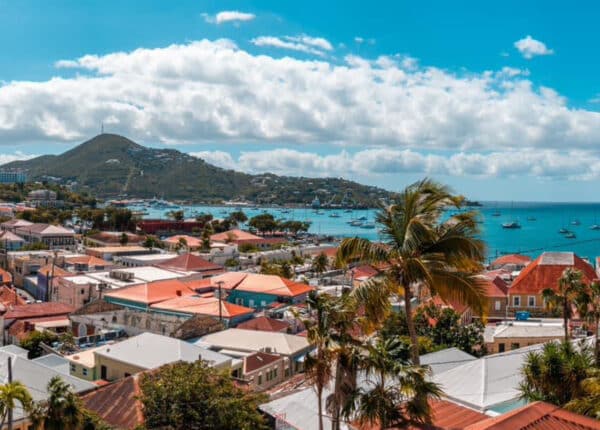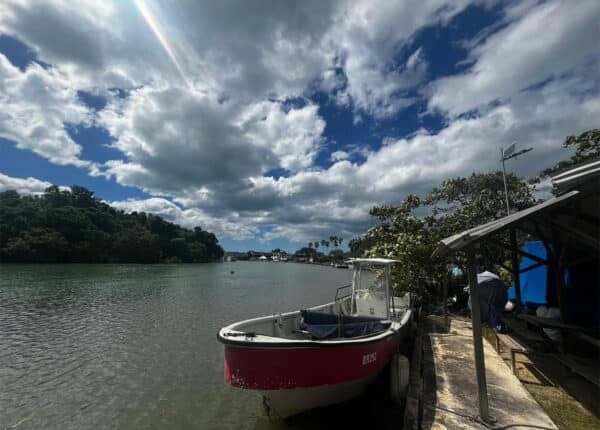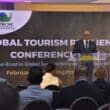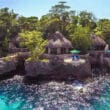Above: the Middlesex Guildhall in London
By Jeffrey Foreman
Op-Ed Contributor
This year is a historic one in the region. In August, Jamaica, then Trinidad and Tobago will mark 50 years as independent nations. These two countries were the first to achieve the vaunted goal of independence. In the past 50 years, both nations have seized the powers that directing the ship of state brings in order to better the lives of their citizenry. As a result, progress has been made across the areas of education, health care, improving systems of governance, and, in the case of the twin-island republic at any rate, significant economic growth.
Differentials in post-independence growth is not the only major difference between the two states. The twin-island republic, in 1976, did away with the British monarchy and became a republic. Dominica and Guyana are also republics, but Jamaica, like most other CARICOM countries, has not made this largely symbolic, but important step.
Things might soon change for Jamaica. That country’s Prime Minister, Portia Simpson-Miller, in her inaugural address on Jan. 5, 2012, when speaking in relation to Jamaica’s 50th year of independence highlighted the “need to complete the circle of independence” by becoming a republic with an indigenous president as head of state. It is her hope to initiate that process this year.
Whenever Mrs Simpson-Miller does so, Section 68(1) of Jamaica’s constitution, a deeply entrenched provision, would need to be amended, and, as a consequence, a referendum would be required. This type of change to a fundamental provision of the constitution, with its requirement of the people being consulted, forms part of the whole idea of making the constitution truly one which is Jamaican.
No one in that country has any influence over the British monarchy – no authority exists to influence who occupies that space atop their institutions of state. Therefore, having a British monarch as head of state does not make that person “Jamaican” in any practical sense. The imprint of that British legacy exists in our legal documents and adorns members of the armed forces, but Jamaicans only see this individual once every decade or so. After 50 years, time really come for Jamaicans to make that change.
Catching up with what the Trinis did in 1976 is one way Jamaicans can add some sense to its governance arrangements. There is, however, one area in which both nations are well overdue on making an advance: making the Caribbean Court of Justice their final court of appeal.
Mrs Simpson-Miller, unlike her Trinidadian counterpart, Kamla Persad-Bissesar, wants Jamaica to take this step during her term in office. This step will require cooperation with the Opposition as a two-thirds majority in Parliament is needed to amend the status of that country’s higher judiciary, in keeping with the steps laid down for such changes in the constitution.
For Mrs Simpson-Miller, this move would “fully repatriate our (Jamaica’s) sovereignty”.
Her comments in this regard are in line with writings of Simeon McIntosh when he makes the case in Constituting the Caribbean Community: The Role of the Caribbean Court of Justice that adjudication of a constitutional document is an “integral and inextricable aspect of sovereignty.”
For, as McIntosh indicated in that article, when he quoted from Bishop Benjamin Hoadly of Bangor, “[W]hoever has an absolute Authority to interpret any written or spoken Laws; it is He, who is truly the Law-giver, to all Intents and Purposes; and not the Person who first wrote, or spoke them.”
So, while allowing the Judicial Committee of the Privy Council to serve as the final court, is an exercise of sovereignty in a technical sense, for all intents and purposes, real sovereignty requires that a constitution (and indeed all other laws) be interpreted by those who are selected by and come from the political community over whom those decisions will have binding effect.
For many, such philosophical entreaties to sovereignty and authoring our own laws are not enough to make them comfortable with the idea of an indigenous Caribbean final court of appeal. The Privy Council has served our region well, they argue. The distance of that court means they will be dispassionate and therefore free of any influence from politicians and other interest groups, they assert with aplomb.
The task of those committed to repatriating sovereignty, then, must include an explanation to the broader society of practical limitations to having the PC as a final court. There must also be a response to concerns (fears, really) that an indigenous court would not be independent of political influence.
The main practical limitation attached to the PC is one of access. The governments of the region do not incur any cost to maintain the PC. Cost is, however, involved in getting to the UK (flights, accommodation, etc) and hiring counsel there to prepare/argue cases. Those same costs are faced by individuals and, given the disparity in resources between the state and the individual, one would expect that an ordinary individual, dissatisfied with the outcome from the Court of Appeal, would think twice about carrying their case further.
The PC as a final court therefore serves as a deterrence to most persons seeking access to the highest rungs of justice available to them. One consequence of this limitation is that only certain types of cases, constitutional, criminal, those affecting moneyed interests, receive the stamp of finality that a final court offers. The trend for the CCJ thus far has been that more civil cases are being heard.
The fears about the CCJ being beholden to partisan political considerations have always been present. Discussions leading to the establishment of the court took this into consideration when it drafted the Agreement. In relation to procedures, an elaborate mechanism for selecting and removing judges is in place. The Regional Judicial and Legal Services Commission, charged with this responsibility, consists of eleven individuals drawn from independent bodies across the region. It’s unlikely such a body would collude to pursue some objective other than selecting the best candidate for the job. Beyond that, judges have security of tenure and the court is responsible for and has its own source of funding.
Some nevertheless argue that institutions alone are not enough. Appearances matter and unless people view judges as being impartial in all respects, the confidence needed to convince them that the CCJ is an appropriate court will never exist.
In support of this point, examples of politicians becoming judges and vice versa, in Barbados and in Trinidad and Tobago are often cited. For Barbados, the appointment of Sir David Simmonds as chief justice of that country brought the independence of the judiciary up for question in some quarters.
Sir Simmons, prior to his appointment, had been a politician for some 25 years. During that time he served as a Member of Parliament, held senior posts in government, including acting as prime minister.
In Trinidad & Tobago, things went the other way. In 2010, Herbert Volney, stepped down from his position on the bench and hours after that became a candidate for the United National Congress (UNC) in the elections of that year. He won his seat, the UNC came to power, and Volney now serves as Minister of Justice.
In Trinidad as well was the episode involving former CJ Satnarine Sharma being charged with perverting the course of justice by influencing the decision of a magistrate in relation to an integrity trial of former PM Basdeo Panday. A tribunal appointed to look into the matter of Sharma being removed from that office for misbehaviour found there was insufficient evidence to so do.
To be sure, the concern raised by these episodes is not the same thing as judges being partial to one theory of how law should operate versus another. This type of partisanship is best exemplified in the US Supreme Court, where ideological differences over the power of the federal government vis-à-vis states, the scope of the president’s power in times of war, whether the constitution should be given an originalist interpretation or seen as a living document, being updated as time progresses. Those types of disagreements require judges to come down on one side in cases where no clear answer is available. Personal experiences, philosophy, etc, thus come front and centre. (Indeed, in the US, unlike most places in the world, judges are elected to office in many states. At the level of the Supreme Court, there has been one judge who once served as president, and the first woman on the court, Sandra Day O’Connor, once served as a state senator in Arizona.)
The contention is that the Caribbean examples raise issues as to whether decisions made in the process of adjudication favour one side over another.
These instances are not legion. Most judges in the region follow the staid practice of serving as lawyers for an extended period of time or joining some department of government and working their way up the system. While on the bench, their views on the issue of the day (which they are entitled to have and as citizens must have) are not known to the public. The judiciary as an establishment operates in the way it should and errors can be corrected at higher levels where more scrutiny is given to decisions.
While examples of the kind highlighted do raise doubts, it doesn’t necessarily follow that judgments are made with a view to favour particular individuals instead of through an objective application of law to fact. In the case of Sir Simmons, for example, none of his judgments were overturned on appeal.
One can understand why this type of fear exists, but the totality of our experience and the institutional mechanisms put in place to “catch” and deal with cases of departure from the norm, prove that we ought not to worry too much.
Independence in the region meant a great deal to those who fought to get it. Even though retrograde steps have been made, that generation’s successors can be given credit for advancing the project of nation-building in the decades after 1962.
In what is a year for both celebration and reflection, let us ensure that those aspects of independence which touch on delinking from alien institutions and practices are done away with for good.
Jeffrey H Foreman is a student in the Faculty of Law at the University of the West Indies at Cave Hill.
Note: the opinions expressed in Caribbean Journal op-eds are those of the author and do not necessarily reflect the views of the Caribbean Journal.







